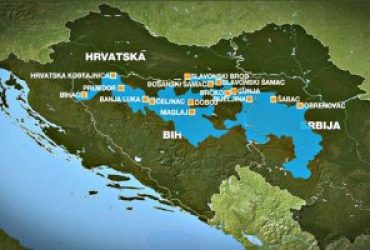First Meeting of “Working Group on the Western Balkans 2030 for the SDGs and the European Union” Sets Priorities for Regional Integration and Sustainable Development
New York, November 22, 2023
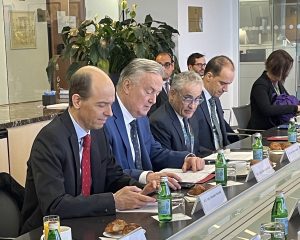 The inaugural meeting of the “Working Group on the Western Balkans 2030 for the SDGs and the European Union” unfolded as a cooperative platform aimed at accelerating regional integration, prosperity, and sustainable development, streamlining the integration of Western Balkans into the European Union with the implementation of SDGs. Chaired by Ambassador dr Zlatko Lagumdžija of Bosnia and Herzegovina and Ambassador Maurizio Massari of Italy, the meeting gathered Permanent Representatives to the United Nations from Western Balkans, European Union and UNDP (Albania, Bosnia and Herzegovina, Montenegro, North Macedonia, Serbia, Italy, Austria, Greece, Slovakia, Slovenia, Croatia, Czech Republic, the Mission of the European Union, and representative of Kosovo).
The inaugural meeting of the “Working Group on the Western Balkans 2030 for the SDGs and the European Union” unfolded as a cooperative platform aimed at accelerating regional integration, prosperity, and sustainable development, streamlining the integration of Western Balkans into the European Union with the implementation of SDGs. Chaired by Ambassador dr Zlatko Lagumdžija of Bosnia and Herzegovina and Ambassador Maurizio Massari of Italy, the meeting gathered Permanent Representatives to the United Nations from Western Balkans, European Union and UNDP (Albania, Bosnia and Herzegovina, Montenegro, North Macedonia, Serbia, Italy, Austria, Greece, Slovakia, Slovenia, Croatia, Czech Republic, the Mission of the European Union, and representative of Kosovo).
Today’s kick-off of the “Working Group on the Western Balkans 2030 for the SDGs and the European Union” underscored the joint commitment and cooperation towards the Western Balkans’ accession to the EU and aligning SDG actions with the EU Green Deal. The launching event of the Group, with the participation of UNDP Administrator, USG Achim Steiner, allowed a first in-depth exchange on how to better sustain cooperation within the region, with a view to pursue sustainable development and socio-economic growth according to the 2030 UN Agenda.
Dr Lagumdzija emphasized the importance of collaborative efforts, stating,
“Our commitment to this partnership mirrors our shared vision for a sustainable and integrated future for the Western Balkans within the European Union.”
Dr. Lagumdzija stressed the imperative nature of aligning the region with the Sustainable Development Goals (SDGs) and the European Union’s targeted agendas. He emphasized the need for robust cross-cutting collaboration and shared progress within the Western Balkans. Dr Lagumdzija underscored the significance of seizing new opportunities and spearheading the development of a cohesive Western Balkan economic community. Furthermore, he highlighted the necessity of nurturing dedicated communities in the realms of green initiatives, healthcare, digital advancements, and education within the Western Balkans. He articulated the importance of integrating these communities into the relevant EU integration processes, emphasizing the pivotal role of aligning regional aspirations with the broader European framework. He also reiterated that the representatives from various settings, including the United Nations System, academia, scientific community, media and NGOs will be invited to contribute to more comprehensive and productive engagement of the Group on specific topics of discussion. UN Resident Coordinators in the Western Balkans will be involved as well to actively participate and advise the work of the Group.
Dr Lagumdžija warmly welcomed the delivery of Mr. Borrell’s letter to the BiH government by the EU ambassadors from the Brussels GoF of Western Balkans to Sarajevo yesterday. In the letter, Mr. Borrell extended his support for BiH’s accession to the EU, supporting the anticipated start of negotiations in December 2023. This significant event solidifies the core objectives of both this Working Group and its associated initiative. Furthermore, he highlighted the importance of extending support to Moldova and Ukraine as they navigate their paths toward EU membership. However, he emphasized the principle that neither of these countries should advance ahead of any Western Balkan country in their progression towards EU accession.
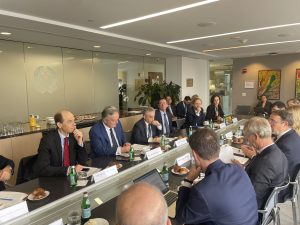 Ambassador Massari echoed this sentiment in his address, affirming, “Aligning our actions with the EU’s Green Deal not only guarantees regional progress but also strengthens our partnership towards mutual goals of sustainability and growth.”
Ambassador Massari echoed this sentiment in his address, affirming, “Aligning our actions with the EU’s Green Deal not only guarantees regional progress but also strengthens our partnership towards mutual goals of sustainability and growth.”
UNDP Administrator Mr. Achim Steiner expressed excitement regarding Ambassadors Lagumdzija and Massari’s initiation of this dialogue and the establishment of the Working Group in New York. Highlighting the unresolved legacy in the Western Balkans, Steiner underscored that the economic narrative underlines and enables political processes. Acknowledging UNDP’s extensive history in the region, he emphasized their commitment to supporting the economic transition by bringing resources and knowledge to the table. Steiner emphasized the criticality of the green agenda in the Western Balkans, echoing a collective focus. Furthermore, he stressed the pivotal role of governments in digital transformation, asserting UNDP’s commitment to offering a global learning platform and resources to support public digital infrastructure in the region.
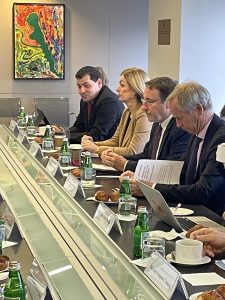
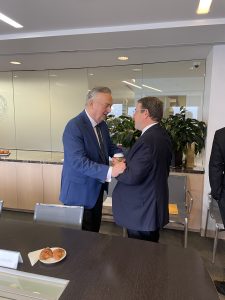
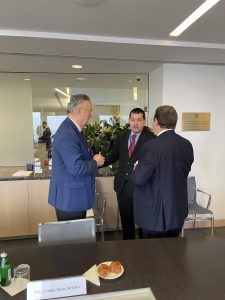
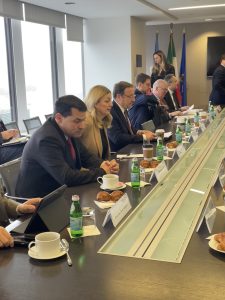 In his role as Head of the European Union Delegation to the United Nations in New York, H.E. Ambassador Olof Skoog highlighted the pivotal need for aligning the Western Balkans’ strategies with the Sustainable Development Goals and the European Union’s agendas. Stressing collaborative endeavors and shared progress, Ambassador Skoog emphasized the imperative of seizing emerging opportunities and fostering a robust Western Balkan economic community spanning green initiatives, healthcare, digital advancements, and education. Additionally, he expressed gratitude to Ambassador Lagumdzija for his extraordinary initiative and acknowledged its importance. Ambassador Skoog affirmed the current momentum within the EU regarding enlargement, emphasizing the necessity for leveraging this momentum collectively. He highlighted that the growth plan is an offer linked to the Reform Agenda 2024-2027, emphasizing its significance in this evolving landscape. Moreover, he reiterated the EU Delegation’s readiness to actively support and collaborate with the future endeavors of the Working Group, aiming for effective coordination and alignment with broader EU strategies for sustainable development in the region.
In his role as Head of the European Union Delegation to the United Nations in New York, H.E. Ambassador Olof Skoog highlighted the pivotal need for aligning the Western Balkans’ strategies with the Sustainable Development Goals and the European Union’s agendas. Stressing collaborative endeavors and shared progress, Ambassador Skoog emphasized the imperative of seizing emerging opportunities and fostering a robust Western Balkan economic community spanning green initiatives, healthcare, digital advancements, and education. Additionally, he expressed gratitude to Ambassador Lagumdzija for his extraordinary initiative and acknowledged its importance. Ambassador Skoog affirmed the current momentum within the EU regarding enlargement, emphasizing the necessity for leveraging this momentum collectively. He highlighted that the growth plan is an offer linked to the Reform Agenda 2024-2027, emphasizing its significance in this evolving landscape. Moreover, he reiterated the EU Delegation’s readiness to actively support and collaborate with the future endeavors of the Working Group, aiming for effective coordination and alignment with broader EU strategies for sustainable development in the region.
Ambassador Evangelos C. Sekeris, Permanent Representative of Greece to the UN underlined their support for the initiative, describing the group as composed of genuine friends of the Western Balkans and the Sustainable Development Goals. Highlighting the EU perspective and the SDGs as driving forces, they emphasized the need for collective work toward achieving these goals and proposed expanding membership to include more states, especially from the Global South and FOSS.
Croatia’s Ambassador, Mr. Ivan Šimonović, reiterated their longstanding support for the inclusion of Western Balkan countries in the EU, emphasizing the need to capitalize on the current geopolitical opportunities wisely and swiftly.
The Ambassador of Serbia, Mr. Nemanja Stevanovic voiced support for the initiative and highlighted the digital success story of the country, citing a $4 billion USD success in exports and positioning Belgrade as the 5th world digital capital. However, they acknowledged shared challenges within the region, particularly brain drain and detrimental demographic changes.
Ambassadors from Austria, the Czech Republic, Albania, Slovenia, and Montenegro all conveyed their respective commitments and perspectives regarding the Western Balkans. Austria reaffirmed the region’s priority in their policies, underscoring their dedication to supporting its development. The Czech Republic expressed support for the initiative while stressing the need for change due to prolonged waiting periods for the Western Balkan countries. Albania urged an acceleration of processes, emphasizing regional cooperation’s expansion and calling for the EU’s serious engagement with the region, linking SDGs and EU integration. Slovenia echoed their commitment to hastening the accession process and achieving SDGs, offering their unwavering support. Finally, Montenegro advocated for balanced and sustainable development within the region, highlighting the necessity of a comprehensive approach.
The Working Group members achieved consensus during the session. They unanimously agreed on the pressing need to address region-specific challenges while harmonizing with the EU integration processes. Recognizing the necessity for inclusive economic growth tailored to the unique needs and priorities of the Western Balkans, the Group reached a unified stance. The alignment of efforts with the EU’s Green Deal was universally acknowledged as a pivotal strategy, serving as a benchmark for regional best practices in achieving the 2030 Agenda.
Participants showed considerable interest in digital connectivity and transformation, acknowledging its transformative potential in mitigating the widespread issue of brain drain in the region. Aligning digital strategies with the EU framework was identified as a cornerstone in positioning the Western Balkans as a competitive hub for skilled talent, offering global opportunities while addressing the challenge of brain drain.
Participants of the Working Group inaugural meeting:
ALBANIA H.E. Mr. Ferit Hoxha, PR Albania to the UN
AUSTRIA H.E. Mr. Alexander Marschik, PR Austria to the UN
BOSNIA HERZEGOVINA H.E. Mr. Zlatko Lagumdžija, PR Bosnia Herzegovina to the UN
CROATIA H.E. Mr. Ivan Šimonović, PR Croatia to the UN
CZECH REPUBLIC H.E. Mr. Jakub Kulhánek, PR Czech Republic to the UN
EU Delegation H.E. Björn Olof Sköög, Head of EU Delegation to the UN
GREECE H.E. Mr. Evangelos C. Sekeris, PR Greece to the UN
ITALY H.E. Mr. Maurizio Massari, PR Italy to the UN
KOSOVO H.E. Mr. Blerim Reka
MONTENEGRO H.E. Mr. Damir Sabanovic, DPR Montenegro(Charge)to the UN
NORTH MACEDONIA H.E. Mr. Ljubomir Danailov Frchkoski, PR North Macedonia
SERBIA H.E. Mr. Nemanja Stevanovic, PR Serbia to the UN
SLOVAKIA H.E. Mr. Richard Galbavy, PR Slovakia to the UN
SLOVENIA H.E. Mr. Boštjan Malovrh PR Slovenia to the UN
UNDP H.E. Mr. Achim Steiner, Administrator of UNDP
USG UNDP H.E. Ms. Ivana Zivkovic, Assistant Administrator/ASG
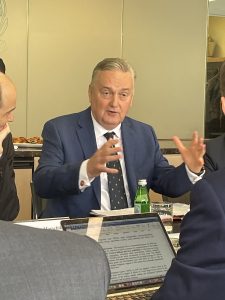

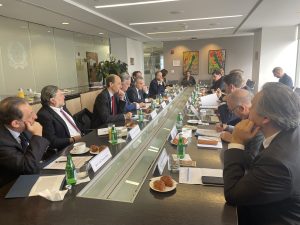
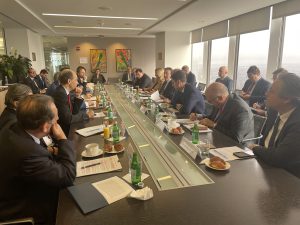
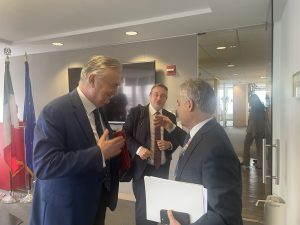
Working Group on the Western Balkans 2030 for the SDGs and the European Union
Objectives and Format of the Working Group:
The Working Group’s primary objective is to expedite the cooperation and integration within the Western Balkan region in its pursuit of sustainable development and socio-economic growth, while aligning with the Agenda 2030 timeline. It emphasizes the mutually beneficial nature of EU integration-based reforms and the implementation of Sustainable Development Goals (SDGs). The meeting highlighted the necessity of aligning the United Nations 2030 Agenda with the Western Balkans’ EU integration efforts, focusing on sustainable socio-economic growth through SDGs and the European Green Deal. The format of the Working Group is designed to remain flexible, allowing for regular updates to its membership. It will conduct HoM-level meetings biannually, with provisions for extraordinary sessions to address specific concerns. An annual gathering at the Foreign Minister-level in New York during the United Nations General Assembly High-Level Week is anticipated, subject to logistical considerations. Italy and Bosnia and Herzegovina were appointed as Co-Chairs of the Working Group.
Key Areas of Action:
Expert-level collaboration within the Group will concentrate on proposing joint initiatives to the United Nations System. The focus areas identified for alignment between SDGs and EU agendas include digital transformation, health, green economy, and education. Moreover, the Working Group has committed to supporting UN Funds, Programmes, and specialized Agencies in implementing SDGs in the Western Balkans, aligning with the European Reform Agenda 2030 and the establishment of an Economic Community or Single Market.
Participation and Engagement:
The meeting emphasized the importance of engaging a diverse range of stakeholders. Representatives from the UN System, academia, scientific communities, media, and NGOs will be invited to provide expert insights and contribute to specific discussion topics. UN Residential Coordinators in the Western Balkans will actively participate in advising the Group’s work, lending valuable regional expertise.
Global Commitments:
In line with the overarching goal of enhancing global governance, the Group reiterated its commitment to upholding the principles enshrined in the United Nations Charter. The aim is to contribute meaningfully to effective multilateralism, fostering cooperation and collaboration in pursuit of shared regional and global objectives.
The launch of this Working Group represents a crucial milestone in fostering cooperation, setting strategic priorities, and creating a roadmap for sustainable development and integration within the Western Balkans

